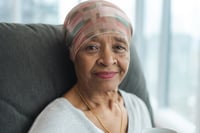Noting that "psychotherapy skills are at the core of clinical psychiatry," and with several forms...
Psycho-oncology Services May Reduce Distress, Depression in Cancer Survivors

Outpatient psycho-oncology services, including pharmacotherapy and psychotherapy, significantly reduced distress in cancer survivors up to two years after their diagnosis, according to a study published in Psycho-Oncology.
“Studies which have assessed the effectiveness of psycho-oncology interventions most often did so early in the patient’s cancer treatment course and not in later phases of survivorship,” wrote Jessica Molinaro, M.D., of the Medical College of Wisconsin and colleagues. “As distress is prevalent throughout survivorship, it is imperative that ongoing assessment of psychosocial concerns, intervention on psychological distress, and coordination of care between providers occurs to ensure the needs of the patient are met.”
Molinaro and colleagues recruited 243 patients who had received a cancer diagnosis and were referred to psycho-oncology services. Participants were referred to treatment for a variety of reasons, including difficulty coping with psychosocial stressors or adjusting to cancer diagnoses. Participants had at least one psycho-oncology visit, and the majority were recommended to return for a second visit. They were seen by a physician, nurse practitioner, psychologist, or licensed clinical social worker, all of whom had expertise in psycho-oncology. Interventions included pharmacotherapy and/or psychotherapy. Patients completed the Distress Thermometer and Problem Checklist (DT + PL) and the nine-item Patient Health Questionnaire (PHQ-9), at the beginning of their first and second visits, and the Distress Thermometer again at the end of each visit.
In total, 174 patients had one psycho-oncology visit and 69 had two, with an average of 20 days between visits. The average time from the initial diagnosis of cancer to the first psycho-oncology visit was 2.5 years. While the patients’ average distress scores before their psycho-oncology visits were clinically significant (defined as a score of ≥4 on the DT), distress scores fell significantly after their sessions and were below the cut-off for clinical significance. Among patients who had two sessions of a psycho-oncology intervention, PHQ-9 scores were significantly reduced from the first to second visit.
“As distress and depression are prevalent throughout survivorship and associated with adverse outcomes and higher health care costs, identifying an effective outpatient psycho-oncology intervention is highly valuable in improving overall cancer care quality and outcomes,” the authors wrote.
For related information, see the Psychiatric News article “Understanding the Breadth and Depth of the Subspecialty: Psycho-Oncology.”
(Image: iStock/FatCamera)
Members Invited to Apply for New Presidential Task Force on Social Determinants of MH
APA members are invited to apply for appointment to the new Task Force on the Social Determinants of Mental Health, which reflects the theme of incoming APA President Vivian Pender, M.D. There will also be eight work groups that will address major issues related to social determinants of mental health. The appointments begin on May 3 and end at the close of the 2022 Annual Meeting. Those interested should submit a CV, brief summary of expertise, and specific area of interest to TFSDOMH@psych.org by April 26.
Don't miss out! To learn about newly posted articles in Psychiatric News, please sign up here.






